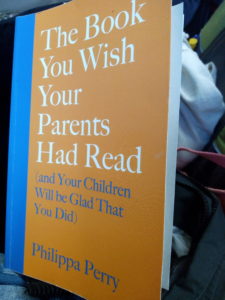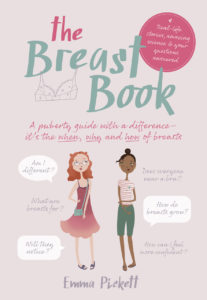 Disclosure: I’m a fan of Philippa Perry. I’ve read her other books and I’ve seen her speak a few times. When I saw that she had written a parenting book, I shamelessly pestered for a review copy and an interview for Sprogcast.
Disclosure: I’m a fan of Philippa Perry. I’ve read her other books and I’ve seen her speak a few times. When I saw that she had written a parenting book, I shamelessly pestered for a review copy and an interview for Sprogcast.
The book arrived (and the interview was arranged; aim for the stars, people). It says it is a parenting book for people who don’t buy parenting books, which seems like an unusual marketing strategy. I think what she means by this is that hers is a non-mainstream position, she doesn’t lay down the usual guidelines about how much sleep the baby needs or pussyfoot around with the whole “just do what’s right for you” approach; nor at any point does she list the useful gadgets and best possible wardrobe for the accessory-baby of your dreams.
TBYWYPHR(&YCWBGTYD) starts by looking at how you, the reader, were parented, and by encouraging some reflection on the impact this has had (or could in future have) on your parenting. There are some short exercises to help with this, and a couple of illustrative anecdotes. It’s about noticing your trigger points, being aware of negative self-talk and where that comes from, and avoiding judgement. These sound like straightforward ideas with sound reasoning behind them, until you ask yourself how to put them into practice.
Happily the rest of the book goes on to explore this process, by looking into the world of the child and showing how empathy and compassion can be such powerful tools both on an everyday basis, and in difficult situations. The chapter on pregnancy was of particular interest, as this is the one place where Perry really gets into the socio-cultural context of parenting. There is a lot more to say about the challenges that modern parents face, in a world where expectations of parents are at odds with this approach. And crucially, most parenting books don’t touch on this at all.
Perry uses her own life experiences to demonstrate some of her points, giving examples where she got it right, as well as examples of when she got it wrong but it turned out okay anyway. What I took from this was not that she was a smug perfect mother who always knew the right thing to say, no, but that none of us is perfect and that just because we get it wrong sometimes that doesn’t mean we shouldn’t try. Parenting is, as Perry says, a long game with a high up-front investment in the relationship.
I felt that the book became increasingly practical, and I was particularly grateful for the ten or so pages on parenting teens (perhaps the next book could expand on this). Parents of toddlers would find it useful, especially on days when parenting feels like wading through mud, and not in a good way. Most people reading it will wish that they had read it sooner, so I am strongly recommending it for the expectant parents in your life, alongside a huge helping of support. While it’s never too late to do better, it’s definitely never too early to be more compassionate and understanding.
 Emma Pickett is just the person to write a book for confused or anxious or curious teenage girls. She has an abundant and fascinating knowledge of the subject, and a humorous, patient tone with which to impart it. What makes this book particularly special is the deep feminism that comes through on every page: your body is normal, your body is good, your body is your own for you to make decisions about.
Emma Pickett is just the person to write a book for confused or anxious or curious teenage girls. She has an abundant and fascinating knowledge of the subject, and a humorous, patient tone with which to impart it. What makes this book particularly special is the deep feminism that comes through on every page: your body is normal, your body is good, your body is your own for you to make decisions about. 
